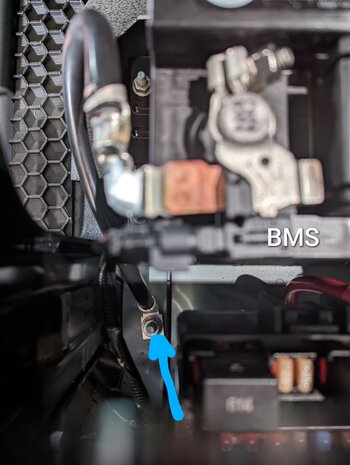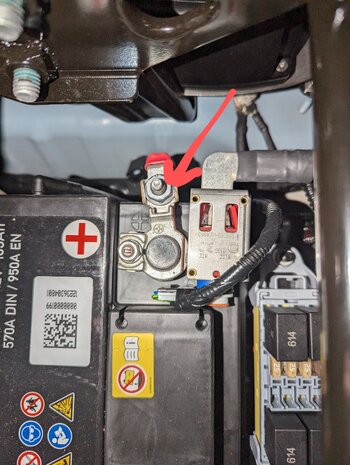Am wondering where the best way to attach a trickle charger to the Grenadier ? Either under the hood/bonnet or to the batteries in the rear seat ?
The Grenadier Forum
Register a free account today to become a member! Once signed in, you'll be able to contribute to the community by adding your own topics, posts, and connect with other members through your own private inbox! INEOS Agents, Dealers or Commercial vendors please contact admin@theineosforum.com for a commercial account.
You are using an out of date browser. It may not display this or other websites correctly.
You should upgrade or use an alternative browser.
You should upgrade or use an alternative browser.
Either will serve the same purpose. Technically, the shorter the cable length between the charger and battery the better, but especially if this is a trickle charger (<5A probably??) voltage drop from the charger should be minimal at best
I put mine under the bonnet.

Much easier then dealing under the seats with a dual battery rig.

I connected up my CTEK charger to the posts on the jump start under the bonnet on the uk drivers side with a permanent pigtail, you can order them on Amazon with 6,8 or 10 mm posts and I used also an extension as the CTEK mains and charger cables are quite short if your mains socket is distance from the car, but again, charger pigtail extension from Amazon with a nice waterproof rubber cap on the end of the socket
Short Answer: Don't charge directly onto the battery posts. The positive jumper post and the corresponding engine ground (negative) under the hood (bonnet) are accessible and convenient. There are other options.
Long Answer: Read @Xrford's informative post here. I also recommend watching the YouTube he provided a link to. Our vehicles are equipped with a Battery Monitoring System (BMS) so battery charging should occur on the vehicle side of the BMS, i.e. -after- the BMS, not directly to the battery posts. This is so the BMS is aware of the charge current.
In the YouTube video the tech has a diagnostic laptop plugged into the vehicle and demonstrates the effects of charging before and after the BMS.
Long Answer: Read @Xrford's informative post here. I also recommend watching the YouTube he provided a link to. Our vehicles are equipped with a Battery Monitoring System (BMS) so battery charging should occur on the vehicle side of the BMS, i.e. -after- the BMS, not directly to the battery posts. This is so the BMS is aware of the charge current.
In the YouTube video the tech has a diagnostic laptop plugged into the vehicle and demonstrates the effects of charging before and after the BMS.
Last edited:
Which ground point are people using when hooking up under the bonnet?Short Answer: Don't charge directly onto the battery posts. The positive jumper post and the corresponding engine ground (negative) under the hood (bonnet) are accessible and convenient. There are other options.
Long Answer: Read @Xrford's informative post here. I also recommend watching the YouTube he provided a link to. Our vehicles are equipped with a Battery Monitoring System (BMS) so battery charging should occur on the vehicle side of the BMS, i.e. -after- the BMS, not directly to the battery posts. This is so the BMS is aware of the charge current.
In the YouTube video the tech has a diagnostic laptop plugged into the vehicle and demonstrates the effects of charging before and after the BMS.
Use the lifting eye bolted to the top of the engine as the ground point. On the diesel, it's under the engine cover, RHS about 2/3 of the way towards the rear. Very obvious once you remove the cover.Which ground point are people using when hooking up under the bonnet?
I’m considering permanently mounting a charger under the rear seat and then having an adapter so an extension cord can be plugged into the car from an outside socket. Where would you recommend attaching the charger to in this case? Thanks in advance!Short Answer: Don't charge directly onto the battery posts. The positive jumper post and the corresponding engine ground (negative) under the hood (bonnet) are accessible and convenient. There are other options.
Long Answer: Read @Xrford's informative post here. I also recommend watching the YouTube he provided a link to. Our vehicles are equipped with a Battery Monitoring System (BMS) so battery charging should occur on the vehicle side of the BMS, i.e. -after- the BMS, not directly to the battery posts. This is so the BMS is aware of the charge current.
In the YouTube video the tech has a diagnostic laptop plugged into the vehicle and demonstrates the effects of charging before and after the BMS.
The positive could go to the positive on the battery, or to the bus bar (if you have a fusable spot open). If the ground it attached to a chassis ground (for instance, where the battery is grounded to the chassis near the seat mount), the shunt will measure it appropriately. The only way to bypass the shunt is for the negative of the charger to be attached directly to the batteryI’m considering permanently mounting a charger under the rear seat and then having an adapter so an extension cord can be plugged into the car from an outside socket. Where would you recommend attaching the charger to in this case? Thanks in advance!
@anand beat me to it!I’m considering permanently mounting a charger under the rear seat and then having an adapter so an extension cord can be plugged into the car from an outside socket. Where would you recommend attaching the charger to in this case? Thanks in advance!
That's my suggestion also.
The negative ground strap is the closest point to the battery. Put a ring terminal under the nut.
The positive is on the battery clamp.
Use an insulated ring terminal here.
For safety I would put an inline fuse in the positive cable. Rate the fuse just above your charger maximum output. This is for charging, not welding!!
Use a cable size rated for DC current that matches your charger output.
Ring terminals are susceptible to fracture if the wiring is unsupported so be sure to secure the cables close to the terminals to relieve mechanical stresses from vibration.
Attachments
My smart charger is permanently installed. I just need to plug the mains power lead into the socket installed at the rear bumper
Note the picture was taken before the consumer output on the smartpass was blanked off.


Note the picture was taken before the consumer output on the smartpass was blanked off.
Hi there. I also have a NOCO charger and had difficulty in getting it to charge. Where did you attach the -ve terminal of the charger? I see the post advising to charge on the engine lifting point (diesel) but can someone please advise how to remove and reinstall the engine cover? Many thanksI put mine under the bonnet.
View attachment 7854426
Lift up gently around the edges and the cover will pop off. See a YouTube here. Scroll to 3:40 for the engine cover.Hi there. I also have a NOCO charger and had difficulty in getting it to charge. Where did you attach the -ve terminal of the charger? I see the post advising to charge on the engine lifting point (diesel) but can someone please advise how to remove and reinstall the engine cover? Many thanks
To reinstall, place the cover over the engine and roughly line up the oil cap. The cover will self-align over the mounting balls. Give it a little wriggle and you'll see it drop into place. Then push down on it around the edges to clip the cover into place. Firm but gentle pressure. Lift up again gently to check it's fully seated.
B57 diesel and B58 petrol/gasoline are the same arrangement.
Hmm… could you not just attach direct to the terminals on the auxiliary battery? You can then rely on the Smartpass to regulate the connection to the primary without troubling the BMS. I was connecting solar input (via MPPT) in this manner without issue…@anand beat me to it!
That's my suggestion also.
The negative ground strap is the closest point to the battery. Put a ring terminal under the nut.
The positive is on the battery clamp.
Use an insulated ring terminal here.
For safety I would put an inline fuse in the positive cable. Rate the fuse just above your charger maximum output. This is for charging, not welding!!
Use a cable size rated for DC current that matches your charger output.
Ring terminals are susceptible to fracture if the wiring is unsupported so be sure to secure the cables close to the terminals to relieve mechanical stresses from vibration.
If you have the aux battery option that should work via the smartpass trickle charge feature. I'm unaware if @nuclearmonkey has that option so I was aiming for a solution that would work for everyone.Hmm… could you not just attach direct to the terminals on the auxiliary battery? You can then rely on the Smartpass to regulate the connection to the primary without troubling the BMS. I was connecting solar input (via MPPT) in this manner without issue…
I connect my solar panel via an Anderson plug wired directly to a D250S solar input.
My suggestion for trickle charging, as posted on a similar thread.
Appreciate all of the replies!If you have the aux battery option that should work via the smartpass trickle charge feature. I'm unaware if @nuclearmonkey has that option so I was aiming for a solution that would work for everyone.
I connect my solar panel via an Anderson plug wired directly to a D250S solar input.
I’m waiting on delivery of a trialmaster, so it will have the smartpass and second battery. It sounds like in this case, connecting directly to the aux battery would still satisfy the ‘downstream of BMS’ condition. I’m assuming the smartpass will link the two batteries together when it senses the voltage increase from the charger (as opposed to doing the intermittent pulse charging thing when the engine is off)?
@Logsplitter - this is the same idea I’m shooting for… ability to charge via extension cord but keep vehicle locked. This way the only thing someone could easily steal would be the cord itself as opposed to the charger as well
So the Smartpass will only link the two batteries directly when the main battery side voltage increases (and then pass up to 120A of charge across to the aux battery). The theory with hooking the charger to the aux battery is that it will keep the aux battery at full charge, and as the main battery depletes the Smartpass will pulse charge from the aux to the main.I’m assuming the smartpass will link the two batteries together when it senses the voltage increase from the charger (as opposed to doing the intermittent pulse charging thing when the engine is off)?
There are other battery isolators that work the way you are suggesting, such as my personal favorite the Blue Sea ML-ACR, which links both batteries when the voltage on either side is high enough. Not to derail this completely, but I used this function on our Tundra, and thus when either the solar or shore power increased the voltage of the aux battery sufficiently, it would connect both batteries and charge both simultaneously (just as if the alternator was charging both)
Similar threads
- Replies
- 1
- Views
- 159
- Replies
- 36
- Views
- 2K
- Replies
- 22
- Views
- 4K





